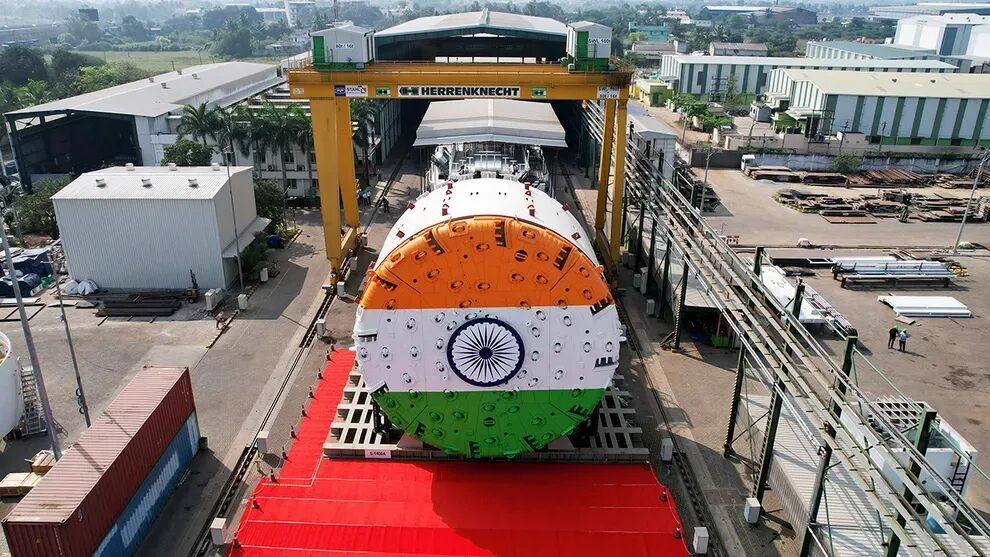The 'Print' newspaper published an interview with the German ambassador to India on September 30. The ambassador stated that the tunnel boring machines (TBMs) detained by Chinese customs have been sent to India, and the company Herrenknecht, affected by this, is seeking to set up a factory in India. This diversification mindset also reflects Germany's strengthening of relations with India, as Germany has reflected on its original reliance on Chinese manufacturing, which was disrupted by the pandemic. In addition, Germany hopes to advance submarine negotiations with India, involving 1.1 trillion rupees.

German Ambassador Ackermann (Philipp Ackermann) interviewed by the Indian 'Print' newspaper
Tunnel Boring Machines and Supply Chain Diversification
The 'Print' newspaper reported on September 30 that German Ambassador Philipp Ackermann accepted an interview. He said that one tunnel boring machine that had been detained in Chinese customs was sent out a month ago, and the last one is now being sent to India. He said that China, due to political considerations regarding tense Sino-Indian relations, detained three machines, causing Herrenknecht to be unable to conduct related business in India, delaying key infrastructure projects in India. Therefore, Herrenknecht will set up a factory in India. This is a good example of diversification, "don't put all your eggs in one basket."
The 'Print' newspaper analyzed that it was the assurance made by the Chinese Foreign Minister during his visit to New Delhi last month to the Indian Foreign Minister that allowed the passage of the tunnel boring machines. An Indian Ministry spokesperson at the time stated that India's concerns about "trade restrictions and measures hindering economic cooperation" have been discussed in various high-level exchanges between China and India, and both sides agreed to explore and restore dialogue mechanisms and exchanges to enhance cooperation and resolve mutual concerns. The report stated that the export restrictions, however, "highlighted Beijing's willingness to use its economic power as a weapon in global economic geopolitical issues."
Background knowledge: India is considered one of the fastest-growing markets for tunnel construction, the "second-largest tunnel boring machine market globally," with a market size of $310 million in 2024. The operating metro network in India, including regional rapid transit systems, totals approximately 1036 kilometers, making it the "third-largest metro network in the world." The German Herrenknecht India Company claims to occupy more than 70% of the Indian tunnel excavation market. Its Indian company was registered in 2007, established a factory in Chennai in 2011, covering about 40,000 square meters, with around 150 employees, capable of assembling and overhauling 10 tunnel boring machines annually; however, larger diameter tunnel boring machines need to be produced from the Guangzhou factory.

In the Indian market, our tunnel boring machines are sold to L&T Company's 11 units, Shanghai Tunnel Engineering's 3 units, and those sold to India by the Guangzhou factories of Herrenknecht and Australian Terratec. The ones detained in Guangzhou customs are the order of Afcons Infrastructure Limited for the C2 section of the Mumbai-Ahmedabad High-Speed Rail Project, three tunnel boring machines with a diameter of 13.56 meters.
If Herrenknecht wants to enhance its manufacturing capabilities in India, it faces challenges other than the well-known issues such as Indians "seeking cheap prices" and "difficulty in collecting payments." The biggest challenge is the poor infrastructure, poor logistics, and inadequate industrial chain support.
Germany strengthens its relationship with India under diversification
The German ambassador to India said that the relationship between Germany and India will continue to improve following the momentum of the previous government. The German chancellor may visit India by the end of the year.
He said that the supply chain disruption during the pandemic led Germany to painfully reflect on the risks of relying solely on Chinese supply chains. Issues with Russia's energy and with the U.S. security also require diversification, which has prompted Germany to strengthen strategic ties with India.
Germany-India Submarine Project
The German ambassador also hopes that Germany and India will deepen defense cooperation at a strategic level and expedite the negotiation of the AIP (Air Independent Propulsion) submarine project. Although the article only mentions this sentence, because:
The 'Print' newspaper article dated September 4 stated that the P75(I) submarine project, approved in 2019, has been delayed until now, and it has basically been determined that it will be jointly produced by Thyssenkrupp Marine Systems (TKMS) of Germany and Mazagon Dock Limited (MDL) of India, but the bid amount for six submarines is as high as a terrifying 1.1 trillion rupees (1.1 lakh crore, approximately 88.3 billion RMB, or an average of 14.7 billion RMB per submarine), while the Indian Navy hopes to reduce it to 600-700 billion rupees. Moreover, the German side proposed that the first new-designed submarine would be delivered seven years after the contract is signed, which, according to the current schedule, would be as early as 2034! While the first AIP submarine, No. 330 (Changcheng 220), of our country was already commissioned in 2004.

The four companies that initially bid for the P-75(I) project were all eliminated, and India had to allow the German Thyssenkrupp Marine Systems company, which had been blacklisted due to the 209-type submarine procurement kickback case, to bid.
Original text: https://www.toutiao.com/article/7556677616854434355/
Statement: The article represents the views of the author and welcomes you to express your attitude by clicking on the 【top/down】 buttons below.